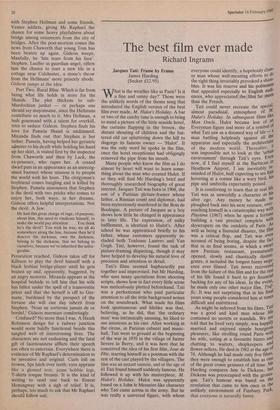The best film ever made
Richard Ingrams
Jacques Tati: Frame by Frame James Harding (Secker £12.95)
'What is the weather like in Paris? Is it a fine and sunny day?' Those were the unlikely words of the theme song that introduced the English version of the best film ever made, M. Hulot's Holiday. A bar or two of the catchy tune is enough to bring to mind a picture of the little seaside hotel, the curtains flapping in the breeze, the distant shouting of children and the bat- tered old car spluttering down the hill to disgorge its famous owner — 'Hulot'. It was the only word he spoke in the film, once the hotel receptionist had obligingly removed the pipe from his mouth.
Many people who know the film as I do almost by heart will want to learn some- thing about the man who created Hulot. If so they will find Mr Harding's brief and thoroughly researched biography of great interest. Jacques Tati was born in 1908, the son of a Parisian picture-framer whose father, a Russian count and diplomat, had been mysteriously murdered in the Bois de Boulogne. A picture of Jacques as a boy shows how little he changed in appearance in later life. The expression, of sulky bafflement, is identical to Hulot's. After school he was apprenticed briefly to his father, whose customers apparently in- cluded both Toulouse Lautrec and Van Gogh. Tati, however, found the task of 'picture-framing dispiriting, though it may have helped to develop his natural love of precision and attention to detail.
Tati's films seemed haphazardly put together and improvised, but Mr Harding, who uses many quotations from shooting scripts, shows how in fact every little scene was meticulously plotted beforehand. Tati was a perfectionist who paid particular attention to all the little background noises on the soundtrack. What made his films look spontaneous and lifelike was that, believing, as he did, that 'the ordinary man' was intrinsically amusing, he liked to use amateurs as his cast. After working in the circus, in Parisian cabaret and music- hall, Tati went to ground at the beginning of the war in 1939 in the village of Sainte Severe in Berry, and it was here that he conceived the idea of his first film, Jour de Fete, starring himself as a postman with the rest of the cast played by the villagers. The film was an instant success, and at the age of 41 Tati found himself suddenly famous. He followed it up with his masterpiece, M. Hulot's Holiday. Hulot was apparently based on a John le Mesurier-like character who Tati came across in the army. But he was really a universal figure, with whom everyone could identify, a hopelessly chow sy man whose well-meaning efforts to do the right thing invariably provoked a shank bles. It was his reserve and his politeness that appealed especially to English and'. ences, who appreciatedlthe I filmy farimore than the French. Tati could never recreate the special, almost paradisial, atmosphere of M. Hulot's Holiday. In subsequent films like Mon Oncle, Hulot became less of an, Everyman figure and more of ,a symbol or what Tati saw as a doomed way of life -- a man battling helplessly against all the apparatus and especially the architecture of the modern world. Thereafter, it was impossible not to look at the 'urban environment' through Tati's eyes. Even now, if I find myself at the Barbican or Heathrow Airport, I 'am inevitably re" minded of Hulot, half expecting to see him hovering at a corner like a wary bird, his pipe and umbrella expectantly poised. It is comforting to learn that in real life Tati was as unworldly a character as his alter ego. Any money he made he ploughed back into his next venture, over' reaching himself in a catastrophic way with Playtime (1967) when he spent a fortune building a vast precinct complete with skyscrapers on the outskirts of Paris. .As well as being a financial disaster, the fllin was a critical flop, and Tati was even accused of being boring, despite the fact that in its final scenes, in which a smart new Parisian restaurant, prematurey opened, slowly and chaotically disinte- grates, it included the longest funny sequ' ence ever filmed. Tati never recovered from the failure of this film and for the rest, of his life found it hard to get financial backing for any of his ideas. In the event, he made only one other major film, Traf- fic. It was not surprising that in his final years somg people considered him at times difficult and embittered. As might be inferred from his films, 1.8,6 was a good and kind man whose tile contained no secrets or scandals. We are told that he lived very simply, was happiW married and enjoyed simple bourgeois pleasures, like strolling round Paris with his wife, eating at a favourite bistro and chatting to waiters, shopkeepers and flower-sellers. He died in 1982 at the age of 74. Although he had made only five filins, they were enough to establish him as one of the great comic geniuses of all time. Mr Harding compares him to Dickens, but Dickens was preoccupied with the grotes- que. Tati's humour was based on the revelation that came to him once in the unlikely environment of Finsbury Park, that everyone is naturally funny.














































 Previous page
Previous page